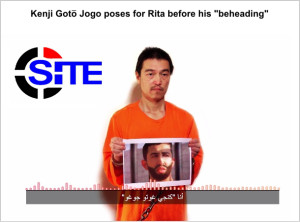Killings of Japanese Hostages by the Islamic State
 A video released on February 1 by the Islamic State of Iraq and Syria (ISIS) showed the beheading of a Japanese journalist, Kenji Goto, and marked the end to a hostage standoff that brought Japan awareness of the dangers of its increasing presence in the Middle East.
A video released on February 1 by the Islamic State of Iraq and Syria (ISIS) showed the beheading of a Japanese journalist, Kenji Goto, and marked the end to a hostage standoff that brought Japan awareness of the dangers of its increasing presence in the Middle East.
The Islamic State informed the world of their two Japanese hostages, Haruna Yukawa and Kenji Goto, through a video on January 20, in which a masked militant demanded a ransom of $200 million. The Japanese Prime Minister Shinzo Abe responded firmly by pledging not to yield to terrorism, and failed negotiations between Japan and the ISIS led to the first beheading of Mr. Yukawa four days later.
Hostage takers then released a new video on January 27, demanding a release of an Iraqi suicide bomber held captive in Jordan in exchange for Mr. Goto’s survival. 24 hours after Japan refused to satisfy the demand once again, the second killing took place. “I will pledge assistance amounting to a total of about 200 million US dollars for those countries contending with ISIS, to help build their human capabilities, infrastructure, and so on,” said PM Abe at the Egypt-Japan Business and Investment Seminar during their ninth joint conference on January 18. The speech, presented by PM Abe, a leader also known for his strong-willed conservatism in reinterpreting Article 9 and expanding the self-defense role, showed his interests in greater efforts in the Middle East.
ISIS referred to this $200 million aid to counter-terrorism promised by PM Abe when they demanded the ransom, and the twelve-day Japanese hostage crisis developed as a result of the rebel group’s intention to warn Japan for its involvement in the region. “Let the nightmare for Japan begin,” said the hostage taker in the video before killing Mr. Goto.
Unlike the United States and other western allies, Japan had been relatively immune to terrorist attacks by the ISIS. The crisis therefore came as a shock to the Japanese public. Following the death report of Mr. Goto, his mother Junko Ishido said on Sunday, “My son’s final act was to go to Syria to help a fellow Japanese, [Mr.Yukawa], please understand his kindness and courage”. In a country where a sense of family and community is well respected, the Japanese public showed great sympathy and attention to PM Abe’s handling of the situation. “Japan has not seen this Western-style expression in its diplomacy before,” Akihisa Nagashima, a former vice minister of defense wrote on Twitter, concerning whether PM Abe means to shift away from pacifist beliefs that Japan has long endured by backing up with military efforts.
Japan’s pacifist ideology, or “weak-kneed diplomacy" from critics’ perspective, has always prioritized its citizens’ safety. Dating back to 1977, the Japanese Red Army, a communist militant group founded in 1971, hijacked a Japan Airlines flight to Dhaka Airport in Bangladesh and took hostage of passengers and crew on board to swap for imprisoned JRA members in addition to $6 million ransom. Former PM Takeo Fukuda at the time fully met their demand and responded, “The weight of a human life is heavier than the earth itself”.
Despite many arguments made from both sides in support or against former PM Fukuda’s decision in the Dhaka crisis, PM Abe’s response towards the IS surely has affected the views on the role of the Japanese government. The New York Times article published on February 1 read, “Departing From Japan’s Pacifism, Shizo Abe Vows Revenge for Killings,” in which states that PM Abe outrageously promised to “make the terrorist pay the price”. A Japanese newspaper organization, in contrast, however, explained use of the word “revenge” as too aggressive and that PM Abe only means “bring to justice,” rather than resort to military actions.
Whether how PM Abe means to pursue his “active pacifism,” the Japanese hostage crisis by the ISIS would be a turning point in his taking future measures regarding the Middle East and in presenting its international image. Series of videos of the two Japanese hostages reaching Japan also raised awareness to ongoing fight against the IS by the Japanese public.
